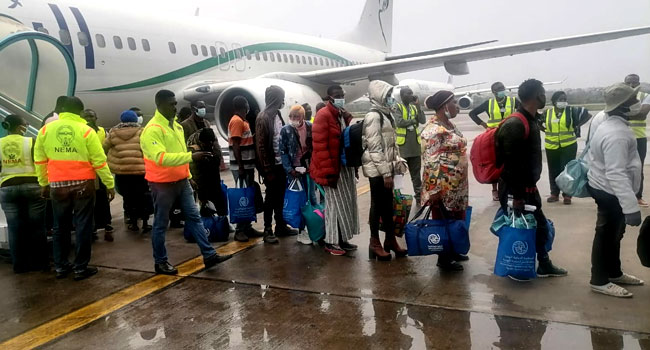The National Emergency Management Agency has confirmed receiving 152 returnees from Libya and another 104 stranded citizens from N’Djamena, Chad Republic.
The Libyan returnees were received at the Cargo Wing of the Murtala Muhammed International Airport, Lagos, while those from Chad were received at the Mallam Aminu Kano International Airport, Kano.
The Lagos Coordinator, NEMA, Ibrahim Farinloye, in a statement, said the 152 Libyan returnees included 25 children and 127 adults, adding that they were returned to the country through the assistance of the International Organisation for Migration and the Nigeria Embassy in Libya.
The statement read, “The Director-General, NEMA, Alhaji Mustapha Ahmed, received the Assisted Voluntary Returnees at the Cargo Wing of the Murtala Muhammad International Airport, Ikeja.
“The returnees, who arrived aboard Al Buraq Air Boeing 737-800 with registration number 5A-DMG, landed around 4.38pm. The profiles of the returnees indicate that 54 adult females, seven children, and three infant females were brought back.
“Also 73 adult males including those with medical cases, eight male children, and seven infant males were among the batch. The International Organisation for Migration and the Nigeria Embassy in Libya collaborated to assist the stranded Nigerians back after their failed attempts to cross over the Mediterranean Sea into Europe.”
Farinloye said the Director-General was represented by the Chief Executive General Service, Mrs. Adenike OgunKunle.
Also, the Coordinator, Kano Territorial Office of the Agency, Dr. Nuradeen Abdullahi, who was represented by the Head of Human Resources, Suleiman Sa’ad-Abubakar, received the Chad returnees at about 2.15pm in Kano on Tuesday.
He said the returnees were transported to Nigeria by SKY MALI Airlines, operated by Ethiopian Airline B737-500 with registration number UR-CQX.
The coordinator said the returnees comprised 34 males, 18 females, and 52 children, who hail from Kano, Katsina, Borno, Akwa Ibom, and Yobe states.
“The returnees were brought back under the care of the International Organisation for Migration from N’Djamena through a voluntary repatriation programme.
“The programme is for the distressed who had left the country to seek greener pastures in European countries and could not afford to return when their journey became frustrated,” he said.


